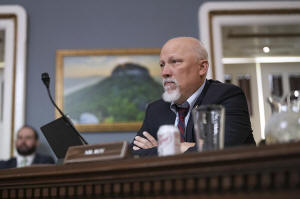Johnson vows to try again after GOP holdouts block action on Trump’s
‘big, beautiful’ budget bill
[April 10, 2025]
By LISA MASCARO and KEVIN FREKING
WASHINGTON (AP) — After abruptly halting votes, House Speaker Mike
Johnson vowed to try again Thursday to approve a Republican budget
framework, having worked into the night to satisfy GOP holdouts who
refused to advance trillions of dollars in tax breaks without deeper
spending cuts.
Even a hefty push from President Donald Trump couldn't heave the package
to approval. Johnson was forced to abandon Wednesday's scheduled action
as the Republican hardliners left him without enough support, and risked
upending what the president calls the “big, beautiful bill," which is
central to his agenda of tax cuts, mass deportations and a smaller
federal government.
“The president is very anxious for us to get this done,” Johnson, R-La.,
said as he left a late-night meeting with the GOP lawmakers. He said he
expects votes on Thursday.
Pushing the budget framework forward would log another milestone for
Johnson, who can only lose a few detractors from his slim majority. A
failed vote, particularly as the economy was convulsing over Trump’s
trade wars, would be a major setback for the Republican agenda in
Washington.
“Stop grandstanding!” Trump had admonished Republicans during a
black-tie fundraising dinner at the National Building Museum earlier in
the week.
Trump told the Republicans, "Close your eyes and get there.”
But by Wednesday afternoon, the outcome was in flux. At least a dozen
conservative Republicans, if not more, stood firmly against the plan.
Several of them, including members of the ultraconservative Freedom
Caucus, made the unusual move of walking across the Capitol to meet
privately with Senate GOP leaders to insist on deeper cuts.
As night fell, Johnson pulled a group of Republicans into a private
meeting room as House proceedings came to a standstill. They stayed into
the night hashing out alternatives.

Johnson said he spoke with Trump for about five minutes while the GOP
meeting was taking place. The GOP speaker said they're trying to figure
out the minimal number of cuts and savings “that will satisfy everyone.”
Options include amending the Senate bill or having a conference
committee work out the differences, among others. "There’s a few
different ideas on the table,” Johnson said.
“We want everybody to have a high degree of comfort about what is
happening here, and we have a small subset of members who weren’t
totally satisfied with the product as it stands,” Johnson said.
But House GOP conservatives, including several of those who met
personally with Trump at the White House this week, remained concerned
that the Senate GOP's blueprint, approved last weekend, does not slash
spending to the level they believe is necessary to help prevent soaring
deficits.
“The Math Does Not Add Up,” Rep. Chip Roy, R-Texas, posted on social
media. He said he would not support it.

Rep. Andy Harris, R-Md., the chair of the Freedom Caucus, led others to
met with Senate Majority Leader John Thune, R-S.D., and other top Senate
Republicans.
“All we can do is make sure that they understand where we’re coming from
and how close we want to work with them to get to the final product,”
Thune said afterward.
But the Senate GOP leader panned the idea of the House sending back an
amended version, which would require another potential all-night voting
session like the one senators endured last weekend. “We can’t do that —
another vote-a-rama, that drags it on indefinitely,” Thune said.
[to top of second column]
|

Rep. Chip Roy, R-Texas, a member of the conservative House Freedom
Caucus, listens as the Republican plan to advance President Donald
Trump's top domestic priorities on spending reductions and tax
breaks is prepared in the House Rules Committee for a floor vote, at
the Capitol in Washington, Wednesday, April 9, 2025. The deficit
hawk has blasted the GOP plan drawing the ire of both Trump and
House Speaker Mike Johnson. (AP Photo/J. Scott Applewhite)

The House and Senate are still at the beginning phase of a process
that will take weeks, if not months, as they turn their budget
resolutions into legislative text — a final product with more votes
ahead later this spring or summer.
Democrats, in the minority, do not have enough votes to stop the
package, but have warned against it.
House Democratic Leader Hakeem Jeffries of New York said the
Republicans' budget plan is reckless and callous as it proposes
slashing budgets to give tax breaks to the wealthy.
“We’re here to make it clear,” Jeffries said. “Hands off everyday
Americans struggling to make ends meet.”
Central to the budget framework is the Republican effort to preserve
the tax breaks approved in 2017, during Trump's first term, while
potentially adding the new ones he promised on the campaign trail.
That includes no taxes on tipped wages, Social Security income and
others, ballooning the price tag to some $7 trillion over the
decade.
The package also allows for budget increases with some $175 billion
to pay for Trump's mass deportation operation and as much for the
Defense Department to bolster military spending.
It all would be partly paid for with steep cuts to domestic
programs, including health care, as part of the $2 trillion in
reductions outlined in the House GOP version of the package, though
several GOP senators have signaled they are not willing to go that
far.
To clip costs, the Senate is using an unusual accounting method that
does not count the costs of preserving the 2017 tax cuts, some $4.5
trillion, as new spending, another factor that is enraging the House
conservatives.
Two Republican senators voted against their package during an
overnight weekend session — Maine Sen. Susan Collins objected to
steep cuts to Medicaid in the House's framework, while Kentucky Sen.
Rand Paul argued the whole package relied on “fishy” math that would
add to the debt.
The package would also boost the nation's debt limit to allow more
borrowing to pay the bills. Trump had wanted lawmakers to take the
politically difficult issue off the table. With debt now at $36
trillion, the Treasury Department has said it will run out of funds
by August.
But the House and Senate need to resolve their differences on the
debt limit, as well. The House GOP raises the debt limit by $4
trillion, but the Senate GOP boosted it to $5 trillion so Congress
would not have to revisit the issue again until after the fall 2026
midterm election.
With Trump's trade wars hovering over the debate, House Republicans
tucked a provision into a procedural vote that would prevent House
action — as the Senate has taken — to disapprove of Trump’s tariffs.
___
Associated Press writers Mary Clare Jalonick, Stephen Groves, Leah
Askarinam and Matt Brown contributed to this report.
All contents © copyright 2025 Associated Press. All rights reserved
 |